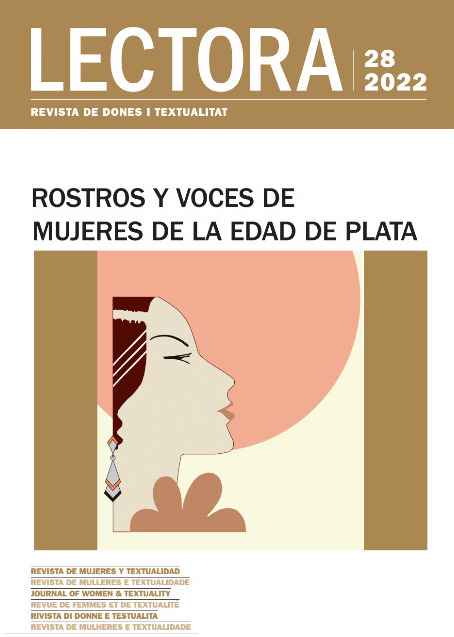Humor Takes Shape: A Feminist Analysis of its Communicative Dimension
DOI:
https://doi.org/10.1344/Lectora2022.28.15Keywords:
question, humour, irony, mobilise, existenceAbstract
This article aims to analyse the presence and role of humour in some feminist artistic proposals and to determine its points of tension and confrontation with dominant discourses. The argument will be based on some of the previous works related to humour (Bajtín, 1987; Eagleton, 2021) and studies that have analysed its potential within feminism (Merrill, 1988; C. Atance, 2018; Álvarez, 2018). On this basis, an attempt will be made to establish a connection with the defence of the communicative character of confession developed by the philosopher María Zambrano. The ultimate goal will be to show how humour comes to stage from a concrete, situated (Haraway, 1995), affected body (Garcés, 2013), so as to deconstruct hegemonic structures of thought and to find other visions and broader meanings. A creative and communicative process that emerges from the complexity of life to pose, in the artistic field, the question of what is possible through the radical imaginaries offered by humour.
References
Adán, Carme (2003), Feminismo e coñecemento. Da experiencia das mulleres ao cíborg, A Coruña, Espiral Maior.
Álvarez Muguruza, Iraide (2018), Otras risas son posibles. El humor: una herramienta política de resistencia feminista, Trabajo Fin de Grado, Euskal Herriko Unibertsitatea.
Bajtín, Mijail (1987), La cultura popular en la Edad Media y en el Renacimiento. El contexto de François Rabelais, Madrid, Alianza.
Birulés Bertrán, Josefina (2003), "La memoria de la muchacha tracia: mujeres y filosofía", Clepsydra: Revista de Estudios de Género y Teoría Feminista, 2: 7-12.
Butler, Judith (2006), Vida Precaria. El poder del duelo y la violencia, Buenos Aires, Paidós.
Caballero, Félix (2012), O humor galego alén da retranca, Cangas do Morrazo, Edicións Morgante.
C. Atance, Belo (2018), Humor Feminista y Auto-representación, Trabajo Fin de Máster, Universitat de Barcelona.
De Diego, Estrella, et al. (2014), Chelo Matesanz: as miñas cousas en observación, Santiago de Compostela, Centro Galego de Arte Contemporánea.
Do Nascimento, Maria S. (2018), "Casada consigo mesma: mulheres palhaças e a busca de uma comicidade feminista", Revista Ártemis, 26 (1): 125-142.
Eagleton, Terry (2021), Humor, Madrid, Taurus.
Garcés, Marina (2013), Un mundo en común, Barcelona, Bellaterra.
Haraway, Donna J. (1995), Ciencia, ciborgs y mujeres. La reinvención de la naturaleza, Madrid, Cátedra.
Jankelevitch, Vladimir (1982), La ironía, Madrid, Taurus.
Labaka Mayoz, Ane (2021), Algara mutilatuak, Zarautz, Susa Literatura.
Laurenzi, Elena (1995), María Zambrano: nacer por sí misma, Madrid, Horas y HORAS.
Linares Bernabéu, Esther (2020), "Hacia un análisis del discurso humorístico reivindicativo desde la perspectiva de género", Language Design Special Issue: 131-115.
Maillard, Chantal (1998), La razón estética, Barcelona, Ediciones Laertes.
Manchado, Raquel (2017), Comadres. La demonización de la amistad entre mujeres, Madrid, Antorcha Ediciones.
Merrill, Lisa (1988), "Feminist Humor: Rebellious and Self‐Affirming", Women’s Studies: An Inter-Disciplinary Journal, 15 (1-3): 271-280.
Pérez Ortiz, Gloria (2015), "Las leyes de violencia de género me parecen un chiste del sistema patriarcal", Píkara Magazine, 25/11/2015.
Pirandello, Luigi (2007), El humorismo. (Esencia, carácter y materia del humorismo), Madrid, Clangre.
Reckitt, Helena y Peggy Phelan (2005), Arte y feminismo, Londres, Phaidon.
Segarra, Marta (ed.) (2010), Entrevistas a Hélène Cixous. No escribimos sin cuerpo, Barcelona, Icaria.
Siurana, Carlos (2015), Ética del humor. Fundamentos y aplicaciones de una nueva teoría ética, Madrid, Plaza y Valdés Editores.
Temprano, Emilio (1999), El arte de la risa, Barcelona, Seix Barral.
Vasallo, Brigitte (2015), "¿Quién teme a la sátira lesbofeminista?", Pikara Magazine, 16/04/2015. Xamardo González, Nicolás (2004), "Comunicación e Interpelación", Estudios sobre el mensaje periodístico, 10: 191-200.
Zambrano, María (2011), Confesiones y Guías, Madrid, Eutelequia Ensayo. —(2014), Obras completas. VI, Escritos autobiográficos (1928-1990), Barcelona, Galaxia Gutenberg. —(2015), Obras completas. I, Libros (1930-1939), Barcelona, Galaxia Gutenberg.
Downloads
Published
How to Cite
Issue
Section
License
The Author retains ownership of the copyright in this article and grants Lectora: revista de dones i textualitat the rights to print publication of the Article. The work will be available under a Creative Commons Attribution-Noncommercial-No Derivative Works license, by which the article must be credited to the Author and the Journal be credited as first place of publication.
The Author is free to enter in seperate, additional contractual agreements for the non-exclusive distribution of the work as published in this journal (such as institutional repositories or a book), as long as the original publication in Lectora is credited.
The Author is encouraged to post the work online (eg in institutional or thematic repositories, or in their website), as it can lead to productive exchanges as well as to a greater citation of the published work (see The Effect of Open Access).




